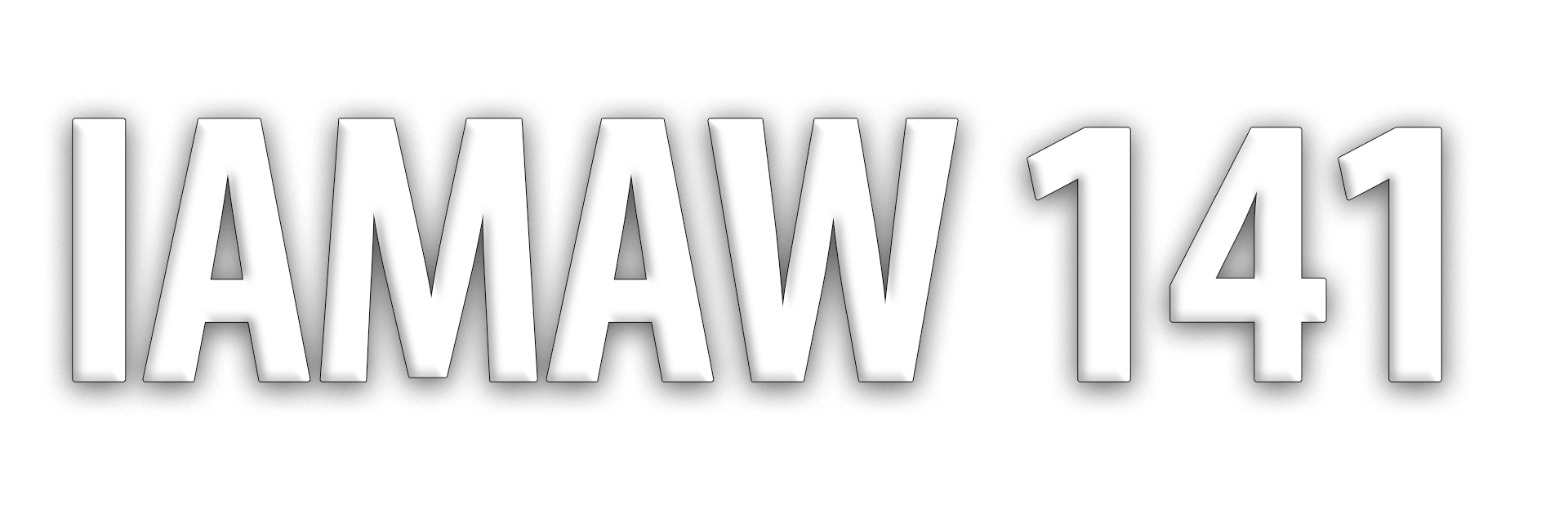
Feb 20, 2020 | EAP, Featured, Helping Hands, Home, Organizing, Uncategorized
The experience of shame—a feeling of being unworthy, bad, or wrong—can be extremely uncomfortable.
Shame has the potential to change the way we see ourselves and may lead to long-lasting social, professional, and other difficulties.
The word “shame” means different things to different people. Shame is very different from guilt and embarrassment. Guilt is usually understood to involve negative feelings about an act one has committed, while embarrassment deals with a societal reaction. Shame, on the other hand, involves negative feelings about oneself, and although a person can be shamed by peers or society in general, shame can also be experienced secretly.
Unresolved shame can lead to feelings of depression, anxiety, and low self-esteem. Shame may also be a symptom of some mental health diagnoses, such as body dysmorphia, or the product of a traumatic experience, such as rape or sexual assault. Living with shame, regardless of the shame’s source, can be a lonely and demoralizing experience. Therapy can help by addressing the underlying cause. When shame is due to a past misdeed, a qualified counselor can support a person to make amends or move on.
WHERE DOES SHAME COME FROM?
The experience of shame can be deeply unpleasant. People experiencing shame are struck by the overwhelming belief that they—as opposed to their actions or feelings—are bad. In some people, this may inspire a change in behavior. In others, shame can be paralyzing. Shame has many sources. Sometimes a person is plagued by feelings of shame without a clear cause. Some studies have linked conditions such as depression or social anxiety to shame. Because mental health conditions such as depression or anxiety remain stigmatized, a person experiencing shame due to these conditions may continually become more ashamed of themselves and their condition, making symptoms worse and making it difficult to seek help.
HOW TO GET HELP FOR SHAME
Getting help for shame begins with identifying shameful emotions. Some people are not conscious of their shame. Others know they feel ashamed, but worry that seeking help will force them to disclose their shame to others. Because shame is linked to feelings of unworthiness and low self-esteem, some people fear that those from whom they seek help will eventually discover that the shame is deserved. They fear exposure, and worry that others will reject them when they see the truth.
These are self-defeating thoughts. Shame is treatable, no matter where it comes from. If you feel that your shame is deserved, it’s important to know that your shame serves no purpose. Instead, it may cause you to harm yourself or others. Brene Brown’s shame resilience theory is a comprehensive approach to preventing and overcoming shame.
Brown argues that resilience to shame has four components:
• Recognizing signs of shame and understanding a person’s triggers for shame.
• Awareness of shame, its cultural origins and how it functions in relationships.
• Reaching out to others to share your story.
• Giving voice to feelings of shame, since shame derives much of its power from secrecy.
HELP DEALING SHAME
Shame often stems from a traumatic experience. A person may fear that they deserved the trauma, experience guilt and shame about having survived, or feel ashamed of sexual or other abuse. When shame is due to trauma, it’s critical that therapy is trauma-sensitive, addressing the root cause of shame. Some treatment options include:
• Cognitive-behavioral therapy (CBT): CBT helps people understand the connection between their thoughts, emotions, and behaviors. Therapists focus on automatic thoughts that typically go unnoticed— such as “I don’t deserve love if I make a mistake.”
• Cognitive processing therapy (CPT): CPT is short term and involves talking about your trauma. CPT works to understand how trauma affects emotions and behavior and implements strategies for controlling the effects of trauma, including shame.
• Stress inoculation training (SIT): Stress inoculation training is a variant of CBT that teaches people how to respond to stress before it overwhelms them. It includes training on breathing techniques, muscle relaxation, noticing and changing automatic negative thoughts, and role-playing exercises.
• Eye movement desensitization and reprocessing (EMDR): EMDR is a stage-based approach to treatment that uses specific eye movements to help a person talk about trauma. Over time, a person learns to manage their emotions and to integrate the trauma into their life story.
These techniques may also work for other forms of shame, such as shame due to depression. Finding a therapist who respects your values and helps you set goals is key. Your local Employee Assistance Program representative listed below can help you find the right resource.
Get the PDF >>
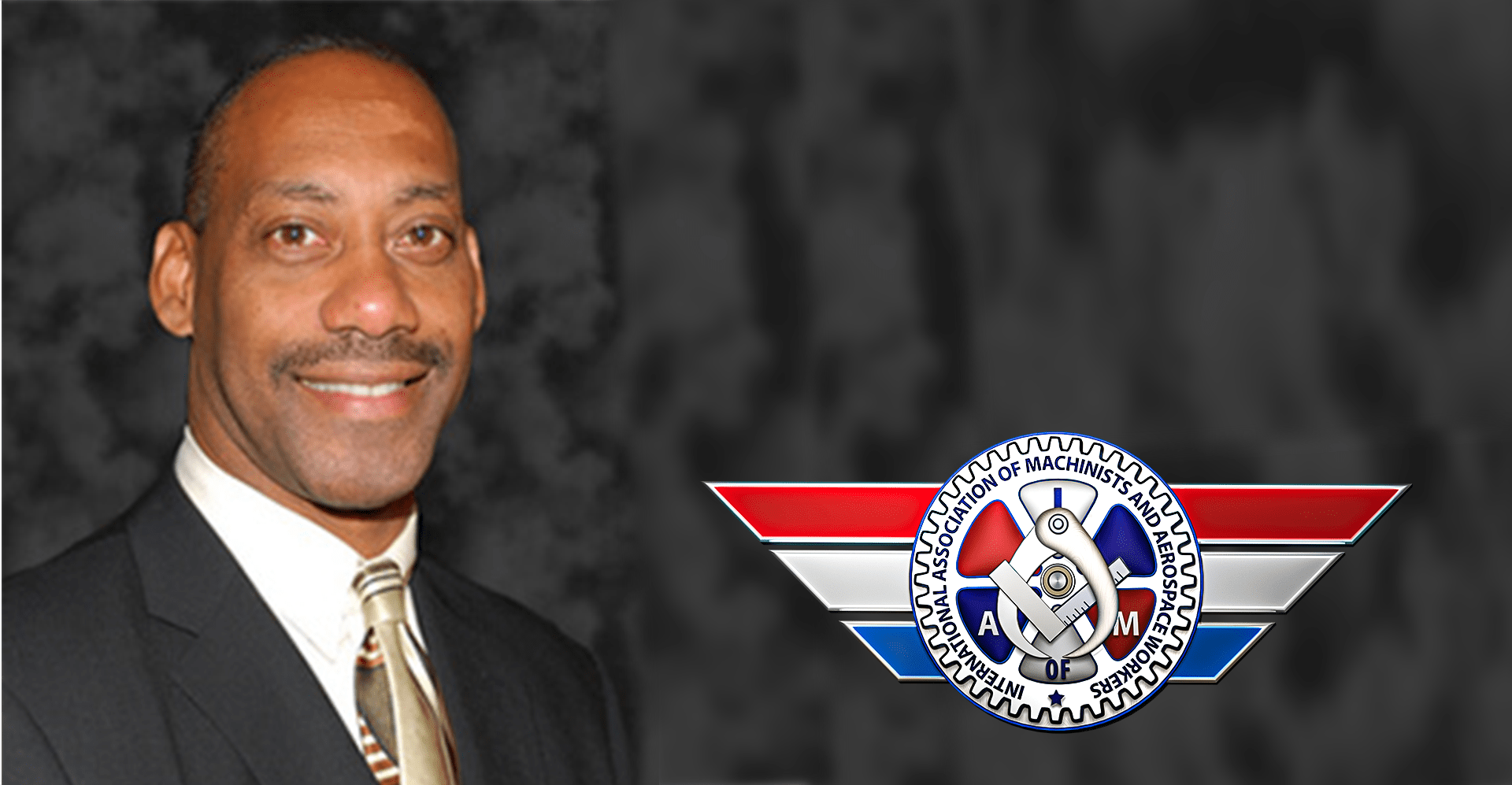
Feb 11, 2020 | Airlines, American, Featured, Home, Uncategorized
A union leader in the world of aviation, Gil Simmons will serve as Grand Lodge Special Representative at the International Association of Machinists and Aerospace Workers.
IAMAW Transportation General Vice President Sito Pantoja announced the appointment in a recent communication to union members. Brother Pantoja also announced the appointment of District 142 General Chair Sean Ryan to the position of Special Representative for the Transportation Territory. The assignments became official in January.
“Sean and Gil have a long history of commitment and dedication to our members which has earned them tremendous respect throughout the IAM,” said Pantoja. “They bring a wealth of experience and knowledge to our department that will serve as a great resource for our team.”
Gil Simmons began his career at US Air in 1985 when he initiated into IAM Local Lodge 1776. While working at US Air (which later merged with American Airlines) for several years, Gil decided he had the tools necessary to create needed workplace improvements. He became a union activist in 2006 and quickly established himself as a trusted advisor and tireless advocate for his fellow workers.
Gil became a Local 1776 Grievance Committee Representative in 2007 and was elected Committee Chair a year later. In 2010, members elected him Vice President At Large at District 141, and later Assistant General Chair, a position he has held since 2011.
Simmons also serves as Airline Coordinator East at the Pennsylvania State Council of Machinists. He is a Trustee for the New Jersey State Council and an IAM delegate to the Pennsylvania State AFL-CIO.
A consummate professional, Gil has helped save countless jobs from unfair terminations, worked to expand workers’ rights, and has devoted himself to creating a broader social and policy-making role for working people.
“Gil understands the importance of working with other union members to advance a strong, pro-worker legislative agenda,” said New Jersey State Council of Machinists President Ines Garcia-Keim. “He was the point person in the effort to affiliate our 42,000 airline workers with the NJ State Council,” she said of his work in New Jersey.
“That’s just one thing Gil has done for which I am grateful,” she said.
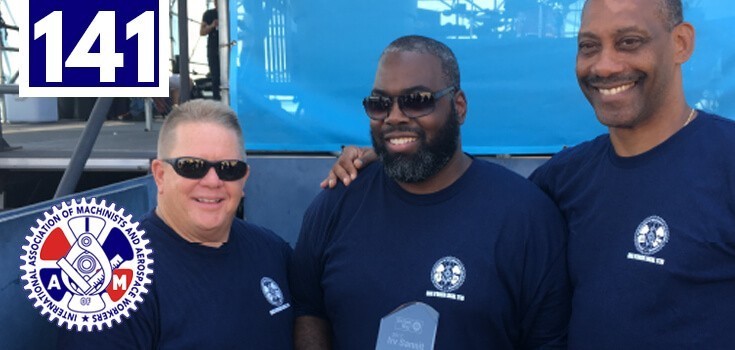
Gil Simmons with IAMAW Local 1776 President Rich Howell and Derrick Monk at a Labor Day Awards Ceremony in 2017.
IAMAW District Lodge 141 President and Directing General Chair Mike Klemm praised Gil’s lifetime of service to airline workers, and said, “For years, Gil has been an incredible advocate for working people. Do not let his modesty and quiet nature fool you; there is nobody that I would rather have on my side than Gil.”
“I’m honored to earn the opportunity to serve my sisters and brothers in whatever way I can,” Gil said of his appointment. “I was proud to work at District 141 and with President Mike Klemm for ten years, and I can count hundreds of friends there. They put me into a position to succeed in what was always a challenging and rewarding job.”
“I learned a lot, and I hope I helped a lot,” Gil said. “I can never really thank District 141 enough.”
As Special Representative, Gil will service local lodges within the IAMAW’s Transportation Territory and will provide assistance and oversight in organizing campaigns.
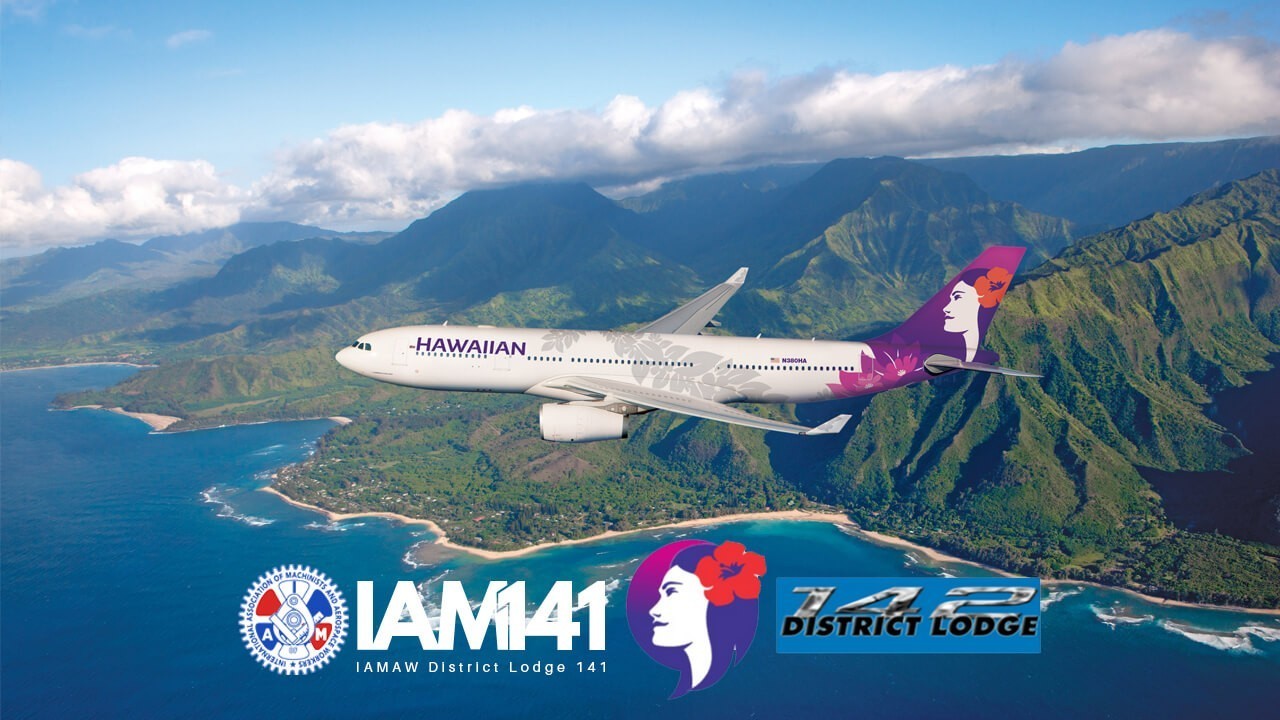
Sep 17, 2019 | Airlines, Departments, Featured, Hawaiian, Home
Sisters and Brothers,
Your feedback is the most critical part of the upcoming contract negotiations.
For most of us, our union agreements will be the most valuable professional document that we will ever encounter. These documents will determine how secure our jobs are, what kinds of benefits we have, and how well we can provide for our families.
Please take a few moments to tell your union negotiators what you need to see in our next contract.
Use the link below to get started:
As always, your input is crucial to winning the contract that we deserve as IAM Members.
This survey is for Hawaiian Airlines members only.
[gdlr_button href=”https://iamaw.checkboxonline.com/Survey.aspx?s=5a4619abc1e948559892ee8d55a05fdf” target=”_blank” size=”medium” background=”#184ab9″ color=”#ffffff” border_color=”#0d2a6b”]Begin Survey[/gdlr_button]
[gdlr_stunning_text background_color=”#f3f3f3″ button=”Download PDF” button_link=”https://iam141.org/wp-content/uploads/2019/09/survey-letter-final-091719.pdf” button_background=”#184ab9″ button_text_color=”#ffffff” button_border_color=”#0d2a6b” title=”2019 IAMAW Hawaiian Airlines Bargaining Survey Letterhead” title_color=”#184ab9″ caption_color=”#a0a0a0″]Please Post on Bulletin Boards[/gdlr_stunning_text]
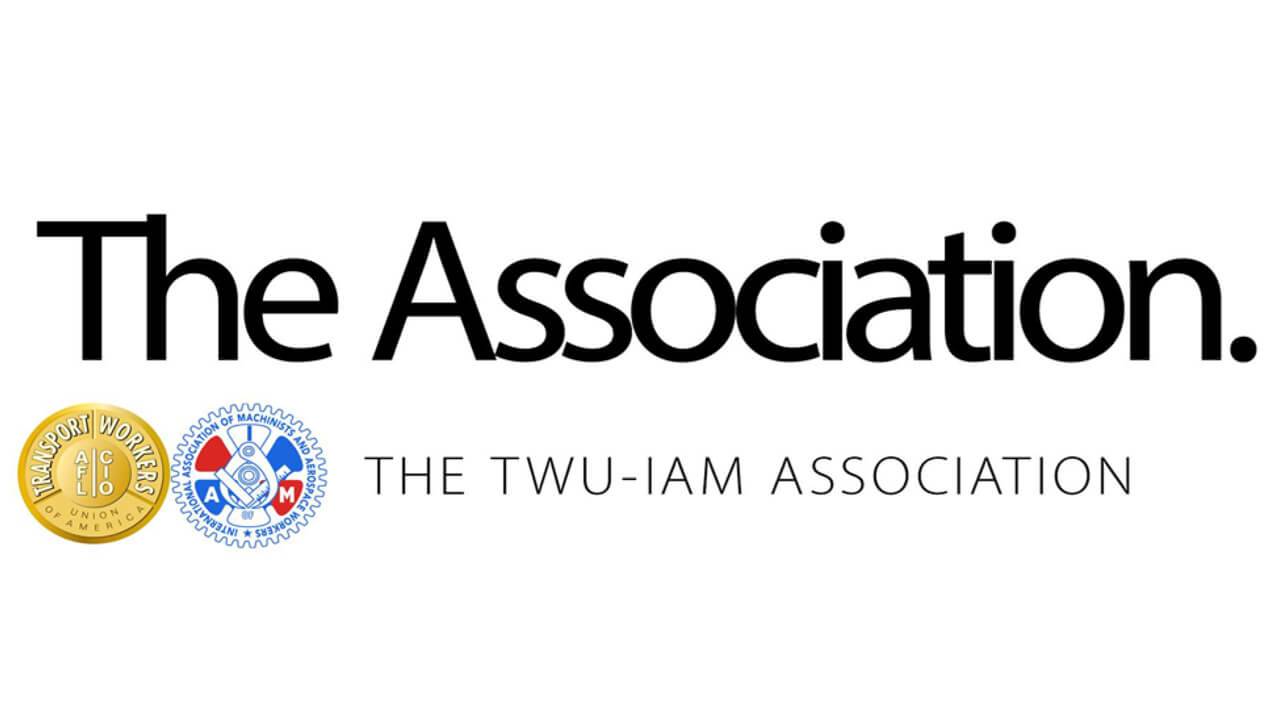
May 29, 2019 | Airlines, American, Departments, Featured, Home, Organizing, The Association
On behalf of the TWU-IAM Association, we would like to take this opportunity to express our sincere gratitude to The Association of Professional Flight Attendants (APFA), The Allied Pilots Association (APA) and The International Brotherhood of Teamsters (IBT) for their letters of support in our contract negotiations fight with American Airlines.
Our negotiations with American are not only important for our members, but for the whole airline industry. The Pilots’, Flight Attendants’ and Teamsters’ words of encouragement and solidarity will go a long way in helping us win this battle against corporate greed.
Click here to read APFA’s Letter of Support
Click here to read APA’s Letter of Support
Click here to read Teamster’s Letter of Support
[gdlr_stunning_text background_color=”#f3f3f3″ button=”Download PDF” button_link=”https://iam141.org/wp-content/uploads/2019/05/Association-Bulletin-52819.pdf” button_background=”#184ab9″ button_text_color=”#ffffff” button_border_color=”#0d2a6b” title=”American Airlines Unions Stand Strong, Association Thanks Union Affiliates for Their Support” title_color=”#184ab9″ caption_color=”#a0a0a0″]Please Post on Bulletin Boards[/gdlr_stunning_text]

